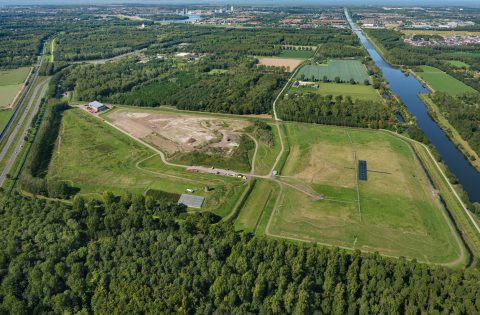In 2008, our landfill site Braambergen in the Netherlands was closed for waste disposal. This year, we also ended other recycling activities at the site. The emerging hills of the landfill have now created a unique hilly landscape that contrasts the typical Dutch flat surroundings. Together with the municipality of Almere and the Forestry Commission (Staatsbosbeheer), Afvalzorg is working on giving this landfill site a beautiful and safe final destination. Our goal is to open up the area for the public to safely enjoy a variety of recreational activities.
It has been many years now since Afvalzorg started making plans for the future purpose of this landfill site. Some of them have already been implemented.
Wine, bicycles and renewable energy
Since 2010, wine is being produced from grapes grown on one of the hills at our landfill site Braambergen. The grape varieties that the ‘Hof of Almere’ City Vineyard grows in the landfill are Rondos, Cabernet Cortis, Johanniter and Solaris. The vineyard produces 1500 bottles of white wine and rosé wine each year. The activities of the winery will expand in the upcoming years.
Together with mountain bike club MTBmore and the Forestry Commission, Afvalzorg constructed a mountain bike trail of more than five kilometres, which contains over 200 vertical metres on the hills of the landfill. The mountain bike trail was made with recycled materials from a nearby highway and was opened in 2019.
Former landfills are ideal locations for solar parks. This year, the construction of a 10 Ha solar park will start at the Braambergen site. The solar park will be installed on top of our sustainable foundation called “Solarbase”. The park will generate approximately 14 million kWh per year – enough to provide renewable energy to more than 4,500 households.
Future projects and upcycling
At this moment, the possibilities for on-site recycling and upcycling projects are being discussed in close collaboration with the municipality of Almere. We are exploring the option to transform a former transfer station into a sawmill for wood coming from forest and park management in the surrounding area. We are also looking into the option of on-site production of sustainable construction materials from flax, hemp and elephant grass that is grown in the surrounding polders. These materials can then be used in construction projects in the city nearby.
